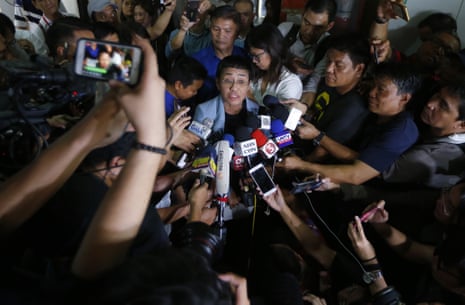Standing on the court steps earlier this month after spending a night in detention, Philippine journalist Maria Ressa spoke defiantly to the dozens of gathered cameras. This was, she pointed out, the sixth time she had posted bail in the space of two months. “I will pay more bail than convicted criminals,” said Ressa. “I will pay more bail than Imelda Marcos.”
Ressa, the editor and founder of Rappler, a Philippine online news outlet which has been highly critical of president Rodrigo Duterte, has borne the brunt of a targeted crackdown on opposition media in the Philippines, a country which just two years ago was considered something of a beacon of free press in south-east Asia.
The witch-hunt against Ressa and Rappler has seen the small but influential news organisation hit with a never-ending series of investigations and charges, from accusations of illegal foreign ownership and tax evasion to the latest charge of cyberlibel. While it is a stark illustration of the Duterte regime’s increasing disregard for press freedom, it is also part of a broader regional trend, which is seeing criminal law weaponised to target journalists and muzzle the press.

“South-east Asia has never been an easy place for press freedom but what we have seen recently is a really alarming decline in almost every country, from arrests in Myanmar and the complete obliteration of opposition press in Cambodia to everything that’s been happening to Rappler in the Philippines. Then also in Thailand, where the junta have spent the past five years of their rule steadily crushing media freedom,” said Shawn Crispin, south-east Asia representative for the Committee to Protect Journalists.
‘Something out of Orwell’s 1984’
In September 2018 Reuters journalists Wa Lone and Kyaw Soe Oo were sentenced to seven years behind bars in Myanmar for breaking the official secrets act. The pair had been investigating the military’s massacre of the Rohingya Muslims in Rakhine state and were among the first to reveal the levels of brutality. Reuters allege the men were set up because of their journalism. But despite a case full of flimsy and contradictory evidence they were convicted and Aung San Suu Kyi’s government has repeatedly resisted calls for them to be pardoned.

Yin Yadanar Thein, director of Free Expression Myanmar, called the situation “dire and marked by self-censorship and fear”. While the election of the NLD government in 2015, led by de facto leader Aung San Suu Kyi, was supposed to mark a new era for freedom of expression in Myanmar, she said it could not be further from the reality. The situation was only worsening, she said, leaving the vast majority of Myanmar people with media “that sounds like something out of George Orwell’s 1984”.
While not yet at the same censorship levels as Myanmar, the weaponisation of the law against critical journalists like Ressa is also increasingly becoming the norm in the Philippines, and cases have also been filed against the board of the Philippine Inquirer newspaper and news channel ABS-CBN. Rappler itself is facing nine legal cases and when Ressa was taken in by officers from national bureau of investigation, she was held overnight in what she described as a stunt.
“The whole thing was just an intimidation tactic to make me and the Rappler team feel like they have the power to take away our freedom, and that’s extremely petty,” Ressa told the Guardian, accusing the government of using “mob tactics”.
“But in the end they overplayed their hand, it just shows abuse of power by the government against the press,” she added. “And they chose the wrong journalist to pick on.”
‘The damage is done’
Thailand, like the Philippines, was also once held up for its independent media, but five years of military rule following the 2014 coup has all but strangled the free press, with multiple journalists arrested and prosecuted for critical coverage of the military under the computer crimes act or charged under the draconian lese majeste act, which prevents any criticism of the monarchy.
While most of the countries in the region have seen a slow burn in the decline in press freedoms, the obliteration of the free press in Cambodia was quick and severe. It followed the dissolution of all opposition political parties and led the way for prime minister Hun Sen to run in July’s election uncontested and unchallenged in the press.

In less than two years, Cambodia went from having a fairly vibrant media industry to the closure of the main opposition paper the Cambodia Daily, the closure of all independent national and local radio stations, the arrest of multiple journalists and the change in ownership of the Phnom Penh Post. The paper is now run by a businessman with connections to Hun Sen, which has led to noticeably pro-regime coverage shift.
There have been international factors at play. Under the Trump administration, the US influence on human rights in south-east Asia has waned considerably. Washington has drawn closer to Vietnam strategically and economically, while the Hanoi regime continued to ramp up arrests, torture and exile of journalists and dissident bloggers over the past 18 months. “Together with Trump’s domestic attacks on journalists it sends a signal to Vietnam that press freedom is not a priority and that the US is willing to ignore how abysmal the situation is for journalists there,” said Crispin.
Pivotal too is the increasing powerful political and economic influence of China. Over the past year Beijing has invested billions into countries across the region, such as Cambodia, and emboldened them to demolish opposition media.
“Several south-east Asian governments are seeing China’s authoritarian regime as a model, while others are getting direct support for surveillance and censorship technology from China,” said Matthew Bugher, head of the Asia programme at human rights organisation Article 19.
The only possible beacon of hope in the region is Malaysia, though optimism has dimmed in recent months. While Malaysia has long had some of the most draconian laws used against journalists and critics – in particular the sedition law, the printing presses act and the recent anti-fake news law – the toppling of Najib Razak in May last year was supposed to herald a new era for press freedom.

The new coalition government led by Mahathir Mohamad has failed to repeal any of the laws which have been used to target critical journalists in the past. Even an attempt to repeal the anti-fake news law, passed by Najib just before his fall from power, failed in the senate.
Zulkiflee Anwar Ulhaque, the celebrated Malaysian political cartoonist known as Zunar, who was persecuted by the Najib regime and given multiple charges for sedition, is not optimistic.
“All the laws that were used by the previous government to shackle critics, they still exist, and I see no serious steps to abolish them,” said Zunar.
“People are still holding back criticism of Mahathir, they still want to give him time, but it cannot last forever,” he added. “I am sure that he will go back to his old way of being a dictator who silences his critics. In my view that is why he is keeping all these laws; because one day he will use them again.”




